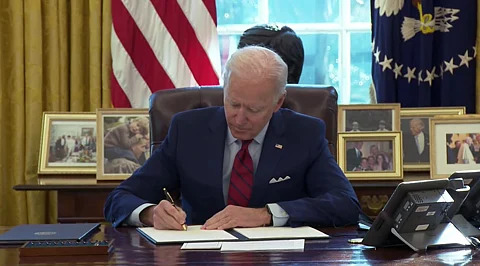

President Donald Trump has asserted that pardons issued by former President Joe Biden to members of the House Select Committee investigating the January 6 Capitol riot, among others, are "void." Trump alleges that the pardons were signed using an autopen and that Biden was unaware of them.
In a post on Truth Social, Trump declared, "The 'Pardons' that Sleepy Joe Biden gave to the Unselect Committee of Political Thugs, and many others, are hereby declared VOID, VACANT, AND OF NO FURTHER FORCE OR EFFECT, because of the fact that they were done by Autopen." He added, "Joe Biden did not sign them but, more importantly, he did not know anything about them! The necessary Pardoning Documents were not explained to, or approved by, Biden. He knew nothing about them, and the people that did may have committed a crime."
Trump further claimed that members of the committee, whom he accused of destroying evidence during their investigation, should be subject to "investigation at the highest level." He reiterated these claims while speaking to reporters aboard Air Force One, stating, "It’s not my decision – that’ll be up to a court – but I would say that they’re null and void, because I’m sure Biden didn’t have any idea that it was taking place."
Historical Use of Autopens and Legal Precedents
Trump’s allegations follow a report by the Heritage Foundation’s Oversight Project, which suggested that Biden’s administration has frequently used an autopen to sign documents. The group claimed that nearly all documents bearing Biden’s signature during his presidency were signed using the device, except for one announcement last year.
However, the use of autopens by U.S. presidents is not unprecedented. According to the Smithsonian Magazine, presidents have used mechanical devices to sign documents since Thomas Jefferson, who employed a polygraph machine. Harry Truman was the first president to use an autopen in the post-World War II era, and its use became publicly acknowledged during Gerald Ford’s administration. More recently, President Barack Obama used an autopen to sign legislation, including an extension of the Patriot Act in 2011 and a financial bill in 2013.
Legal precedents also contradict Trump’s claims. In 1929, the U.S. Justice Department ruled that the method of issuing a pardon is entirely at the president’s discretion. Last year, a federal appeals court further clarified that presidential pardons do not need to be in writing. These rulings suggest that the use of an autopen does not invalidate a pardon.
Biden’s Controversial Pardons
On January 20, his last day in office, Biden issued pre-emptive pardons to several individuals, including General Mark A. Milley, Dr. Anthony Fauci, members of the January 6 Select Committee, and U.S. Capitol and D.C. Metropolitan police officers who testified before the committee. Biden stated that these individuals "have served our nation with honor and distinction and do not deserve to be the targets of unjustified and politically motivated prosecutions."
Biden also pardoned his son, Hunter Biden, who faced felony charges for lying on a federal gun form and tax violations. The president argued that his son was "selectively and unfairly prosecuted" due to political motivations, stating, "No reasonable person who looks at the facts of Hunter’s cases can reach any other conclusion than Hunter was singled out only because he is my son – and that is wrong."
While the gun charges carried a maximum sentence of 25 years and the tax charges up to 17 years, legal experts note that federal defendants rarely receive the maximum penalty, and Hunter Biden may not have faced prison time.
Conclusion
Trump’s claims about the invalidity of Biden’s autopen-signed pardons have sparked a debate over the historical use of such devices and the legal authority behind presidential pardons. While Trump insists the pardons are "null and void," historical and legal precedents suggest otherwise. The controversy underscores the ongoing political tensions surrounding the January 6 investigation and the broader implications of presidential clemency.